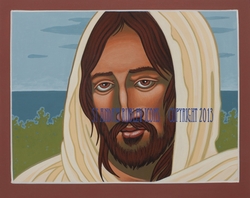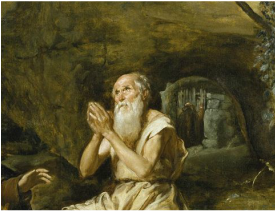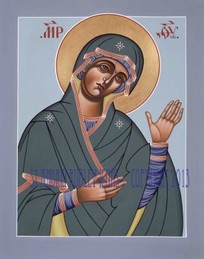 Sometimes we can unconsciously romanticize the lives of the saints such that we think of them as having it easy because they had so many spiritual gifts. Much as we want them to be ‘just like us’ so that we can relate to them, we tend to think of them as knowing all things through prayer, or having phenomenal gifts that somehow exempted them from the struggles we face in our daily lives. While it is true that some of them did have extraordinary gifts from God, there was usually some suffering that came with living with something which could evoke a lot of jealousy or misunderstanding from others. What makes a person a saint, however, is how they respond to the gifts they were given, not the gifts themselves. It is the love with which they lived (and their love for God) which shone through in all things which makes us recognize them as saints. In the gospel for this Sunday Jesus asked the men who sought him out, “What are you looking for?” They responded by going with Him to the place where He was staying. It is clear that they were seeking the Messiah; however, they did not know in what way they would live their lives as followers. They were open and had a hunger for God which allowed them to leave everything and follow Him wholeheartedly. But the question Jesus asked was not just for them. It is important that we hear this question which is also addressed to us: “What are you looking for?” We may not be able to articulate it, but most of us are looking for the same thing the apostles were looking for: the love of God, answers to how to live our lives in the midst of conundrums, difficult people, painful situations, the brokenness of the world and our own brokenness, all while trying to serve Him and grow in holiness. The answer to these things lies in our relationship with Jesus.  What the disciples and holy ones discovered in following Jesus is that there are many ways in which we can bring the Gospel message into the world. They found that they were each invited to bring the Good News to everyone, but each did it in his or her own way, according to the gifts they were given. God wants all people to know His love and so the disciples knew they needed to bring it to others in order to bring about the Kingdom, but how they did it was as individual as each disciple. That meant each one had to follow the call that was given personally and uniquely. In following the call, we will find what they found: the answer to our own questions is Jesus Himself. Throughout the centuries there have been many saints and holy people who have followed the call of Jesus in unique ways. One example of this is St. Anthony of the Desert, the first of the desert monks in the fourth century. When he was around 18 years of age his parents died, leaving him their wealth. Soon afterward he heard the gospel verse, “If you wish to be perfect, go, sell what you have, and give to the poor, and you will have treasure in heaven. Then come, follow me.” (Matt. 19:21) He was so moved by this that he felt the need to respond literally. He chose to distribute his wealth to the poor and left for a place outside the village so that he could pray. From there he began to seek out wise and holy people so that he could learn what it would take to live a life totally attentive to God. He eventually became the wisdom figure others sought out. There were many temptations to leave his lifestyle and return to the city, but he stayed in the desert and continually prayed so he might minister to others. He became the father of desert monasticism, which eventually gave rise to monasteries as we know them.  One thing that is impressive about St. Anthony is that he left everything behind to lead a life that was all but unheard of at the time. We, too, are called to spread the gospel, and we discern our path by listening to God in our prayer. Whether it is to enter ordained or religious life, enter into marriage, or to simply follow God’s call to a particular occupation, service, or community within our lifestyle, we all have to leave everything behind at some point and begin life in a new place or a new way. This is not unique to St. Anthony. All of us have to embrace the changes that life brings us, especially as we seek to serve God. St. Anthony recognized what was within Jesus’ question, “What are you looking for?” It was a call to true poverty, which is not necessarily material poverty, though for him that was included. True poverty is a poverty of spirit and a radical acceptance of the life to which we are called, a life of a total response of love to God. St. Anthony learned that true poverty is freeing, though he had to struggle for a long time to get to the point of real interior freedom. True poverty is trusting God so deeply that we let go of having things ‘our way,’ going with the urgings of the Holy Spirit in order to love in our own unique way. It certainly includes generosity to the poor. But what is of even greater importance is giving that which is within us to those who are the poor spiritually, emotionally, or physically: poverty can be from a lack of understanding of God’s great love, or it can be from being neglected, lonely, ill, victimized by injustice, marginalized and forgotten because one is not dynamic or has a disability. Everyone has brokenness, and therefore we can reach out to others to be with them in their poverty. And therefore, we recognize that we, too, are poor.  St. Anthony of the Desert teaches us to become attuned to our own poverty. We cannot singlehandedly solve privation and misfortune, or stop war, injustice, terrorism, hatred, bigotry, or the effects of natural disasters. We cannot take away the pain of a person who is mourning, hurt, or broken in any way. That is our poverty. But what we can offer is the power of our love which comes from being powerless ourselves. The power of our love comes from God. Just as St. Paul said, when we are weakest then we are truly strong. It is Jesus Christ who becomes our strength. (2Cor.12:10) It is the faith, hope, and love which He gives us that becomes the wealth we share with the impoverished. We can offer the solidarity of our presence and the small actions of love and care that do, in fact, help people to know they are not alone and that they are loved. And we can (and should) work against violence and injustice. Some of us are called to take visible, public action and some are called to simply be available to those around them, working in the background by simply giving loving responses to whatever situation we are in. Some are called to give materially and monetarily, and others are called to serve like St. Anthony, giving our lives in a radical way to the church and the world. What is most important is to realize that the most radical form of love, which St. Anthony teaches us, is to be open and to be forgiving. It is said that at one point in his life he chose to be literally sealed into a room because he was afraid that being so sought after would lead him to pride. However some people were very upset when he would not come out, so they broke down the door to get to Anthony. Instead of responding in anger, he forgave them and ministered to their needs. If we are to follow, forgiveness is the most powerful and most radical form of love we can have. Like Anthony we have to learn to wrestle with the demons which keep us from making a loving response, and learn to have the deepest form of poverty, which means we try to do what Jesus taught us to do. To love means to forgive unceasingly.  Therefore let us pray about our response to Jesus when He asks us what we are looking for. I believe what we are looking for, we already have. We have love and acceptance from God, and we each have a set of gifts and talents which uniquely empower us to serve those around us. Let us embrace the call to live as disciples. Like Jesus, (and St. Anthony of the Desert), we must respond by showing others the way to the Father expressed in our own inner poverty and in the richness of our love. May we have the grace of being comfortable with our own poverty, and may we have the humility to recognize that we are all poor! May we receive the grace to hear and respond to Jesus’ question about what it is we seek! May we recognize the power of our poverty, that we can be one with those who are suffering by sharing our presence and our love! And may we pray for discernment so that we can make good choices, consistent with the gospel! Let us continue to meet in the heart of Jesus! Peace! ©Michele L. Catanese The photos are mine. The first was taken in Ireland in County Mayo. The fisherman had just thrown their nets, and so this reminds me of the apostles being called as fishers of men. The second photo of the bare branches and leaves was taken in Lost Maples State Park in Texas. The image image and the icon at the end are by Fr. William Hart McNichols. First is The Galilean Jesus. It can be found at http://www.fatherbill.org/all-categories/product/293-the-galilean-jesus. The icon is Mother of God She Who Hears the Cries of the World. It can be found at http://www.fatherbill.org/all-categories/product/220-mother-of-god-she-who-hears-the-cries-of-the-world. I chose the icon of Mary because she is attuned to our needs and intercedes on our behalf. Following this is a painting of Saint Anthony of the Desert by Diego Rodríguez de Silva y Velázquez (1599 – 1660).
Carmella Wygant
1/19/2015 12:58:40 am
Thank you for the clarity, forgiveness is the most powerful and radical expression of love. I too think what we are looking for we already have Comments are closed.
|
Heart Speaks to Heart
|

 RSS Feed
RSS Feed

